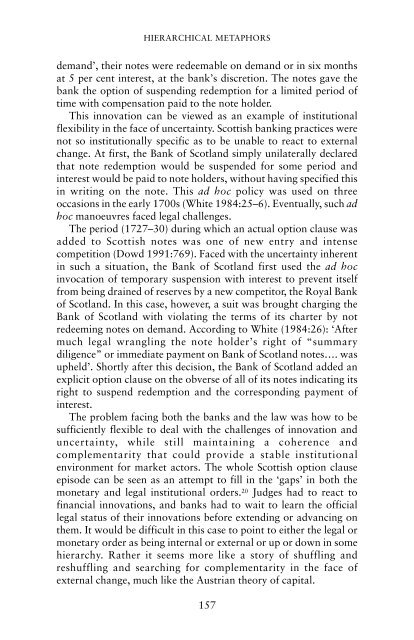Subjectivism and Economic Analysis: Essays in memory of Ludwig ...
Subjectivism and Economic Analysis: Essays in memory of Ludwig ...
Subjectivism and Economic Analysis: Essays in memory of Ludwig ...
Create successful ePaper yourself
Turn your PDF publications into a flip-book with our unique Google optimized e-Paper software.
HIERARCHICAL METAPHORSdem<strong>and</strong>’, their notes were redeemable on dem<strong>and</strong> or <strong>in</strong> six monthsat 5 per cent <strong>in</strong>terest, at the bank’s discretion. The notes gave thebank the option <strong>of</strong> suspend<strong>in</strong>g redemption for a limited period <strong>of</strong>time with compensation paid to the note holder.This <strong>in</strong>novation can be viewed as an example <strong>of</strong> <strong>in</strong>stitutionalflexibility <strong>in</strong> the face <strong>of</strong> uncerta<strong>in</strong>ty. Scottish bank<strong>in</strong>g practices werenot so <strong>in</strong>stitutionally specific as to be unable to react to externalchange. At first, the Bank <strong>of</strong> Scotl<strong>and</strong> simply unilaterally declaredthat note redemption would be suspended for some period <strong>and</strong><strong>in</strong>terest would be paid to note holders, without hav<strong>in</strong>g specified this<strong>in</strong> writ<strong>in</strong>g on the note. This ad hoc policy was used on threeoccasions <strong>in</strong> the early 1700s (White 1984:25–6). Eventually, such adhoc manoeuvres faced legal challenges.The period (1727–30) dur<strong>in</strong>g which an actual option clause wasadded to Scottish notes was one <strong>of</strong> new entry <strong>and</strong> <strong>in</strong>tensecompetition (Dowd 1991:769). Faced with the uncerta<strong>in</strong>ty <strong>in</strong>herent<strong>in</strong> such a situation, the Bank <strong>of</strong> Scotl<strong>and</strong> first used the ad hoc<strong>in</strong>vocation <strong>of</strong> temporary suspension with <strong>in</strong>terest to prevent itselffrom be<strong>in</strong>g dra<strong>in</strong>ed <strong>of</strong> reserves by a new competitor, the Royal Bank<strong>of</strong> Scotl<strong>and</strong>. In this case, however, a suit was brought charg<strong>in</strong>g theBank <strong>of</strong> Scotl<strong>and</strong> with violat<strong>in</strong>g the terms <strong>of</strong> its charter by notredeem<strong>in</strong>g notes on dem<strong>and</strong>. Accord<strong>in</strong>g to White (1984:26): ‘Aftermuch legal wrangl<strong>in</strong>g the note holder’s right <strong>of</strong> “summarydiligence” or immediate payment on Bank <strong>of</strong> Scotl<strong>and</strong> notes…. wasupheld’. Shortly after this decision, the Bank <strong>of</strong> Scotl<strong>and</strong> added anexplicit option clause on the obverse <strong>of</strong> all <strong>of</strong> its notes <strong>in</strong>dicat<strong>in</strong>g itsright to suspend redemption <strong>and</strong> the correspond<strong>in</strong>g payment <strong>of</strong><strong>in</strong>terest.The problem fac<strong>in</strong>g both the banks <strong>and</strong> the law was how to besufficiently flexible to deal with the challenges <strong>of</strong> <strong>in</strong>novation <strong>and</strong>uncerta<strong>in</strong>ty, while still ma<strong>in</strong>ta<strong>in</strong><strong>in</strong>g a coherence <strong>and</strong>complementarity that could provide a stable <strong>in</strong>stitutionalenvironment for market actors. The whole Scottish option clauseepisode can be seen as an attempt to fill <strong>in</strong> the ‘gaps’ <strong>in</strong> both themonetary <strong>and</strong> legal <strong>in</strong>stitutional orders. 20 Judges had to react t<strong>of</strong><strong>in</strong>ancial <strong>in</strong>novations, <strong>and</strong> banks had to wait to learn the <strong>of</strong>ficiallegal status <strong>of</strong> their <strong>in</strong>novations before extend<strong>in</strong>g or advanc<strong>in</strong>g onthem. It would be difficult <strong>in</strong> this case to po<strong>in</strong>t to either the legal ormonetary order as be<strong>in</strong>g <strong>in</strong>ternal or external or up or down <strong>in</strong> somehierarchy. Rather it seems more like a story <strong>of</strong> shuffl<strong>in</strong>g <strong>and</strong>reshuffl<strong>in</strong>g <strong>and</strong> search<strong>in</strong>g for complementarity <strong>in</strong> the face <strong>of</strong>external change, much like the Austrian theory <strong>of</strong> capital.157

















